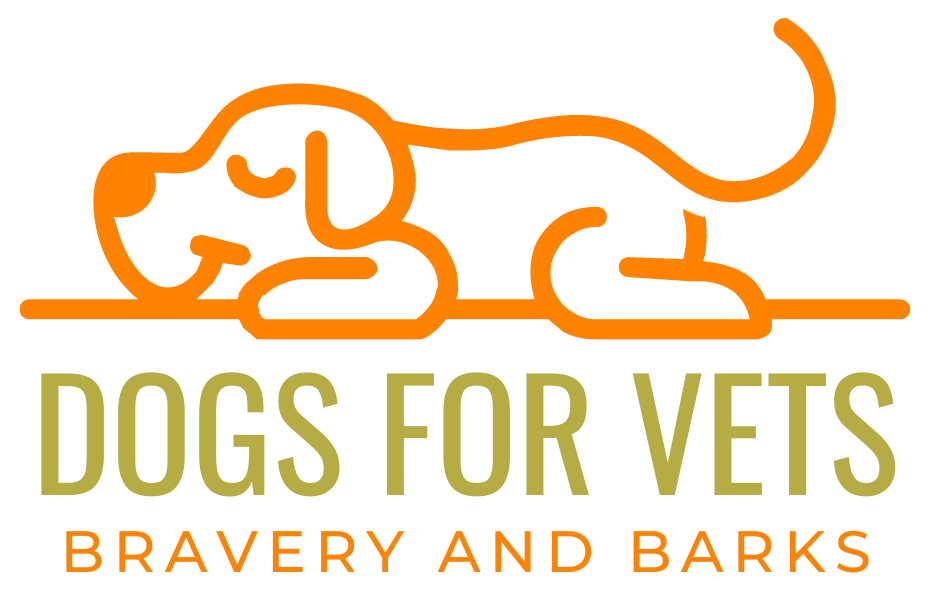This post may contain ads and affiliate links and we may earn a small commission when you click on the links at no additional cost to you. As an Amazon Affiliate, we earn from qualifying purchases. You can read our full disclaimer here.
Poodle Service Dog: Changing Lives with Skill and Intelligence
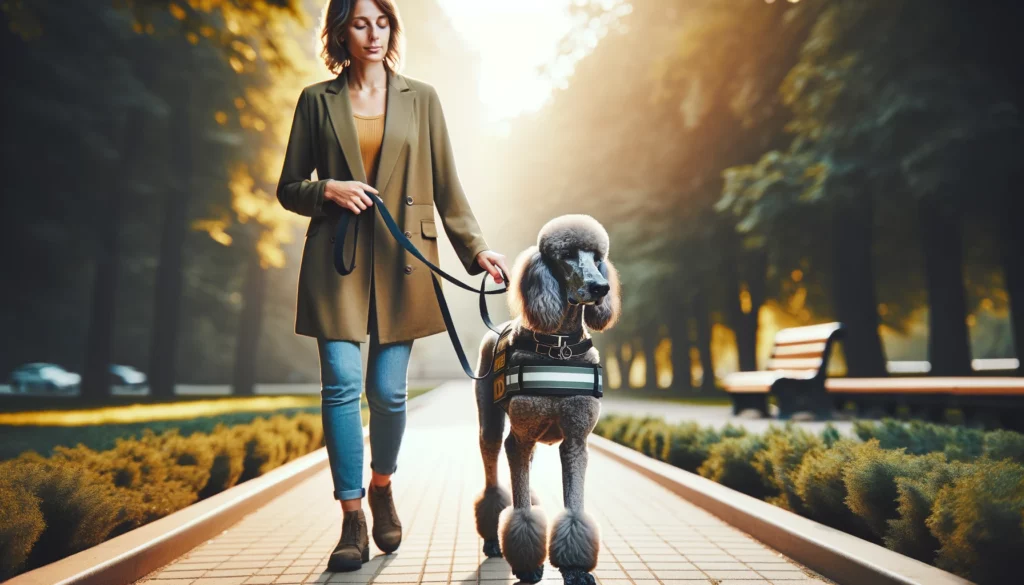
Are you thinking about getting a service dog? A poodle service dog is increasingly becoming a popular choice.
Known for their intelligence and versatility, poodles excel in service roles. Their hypoallergenic coats are ideal for people with allergies, and their intelligent, gentle nature makes them fast learners and reliable companions in service.
Poodle Service Dog: A Versatile and Intelligent Choice
Firstly, poodles are remarkable in their ability to adapt to a wide range of tasks. They are skilled in guiding people with visual impairments, assisting with mobility, and providing life-saving alerts for various medical conditions.
Besides their ability to perform complex tasks, poodles possess a calm temperament and sociability, making them comforting companions in public places.
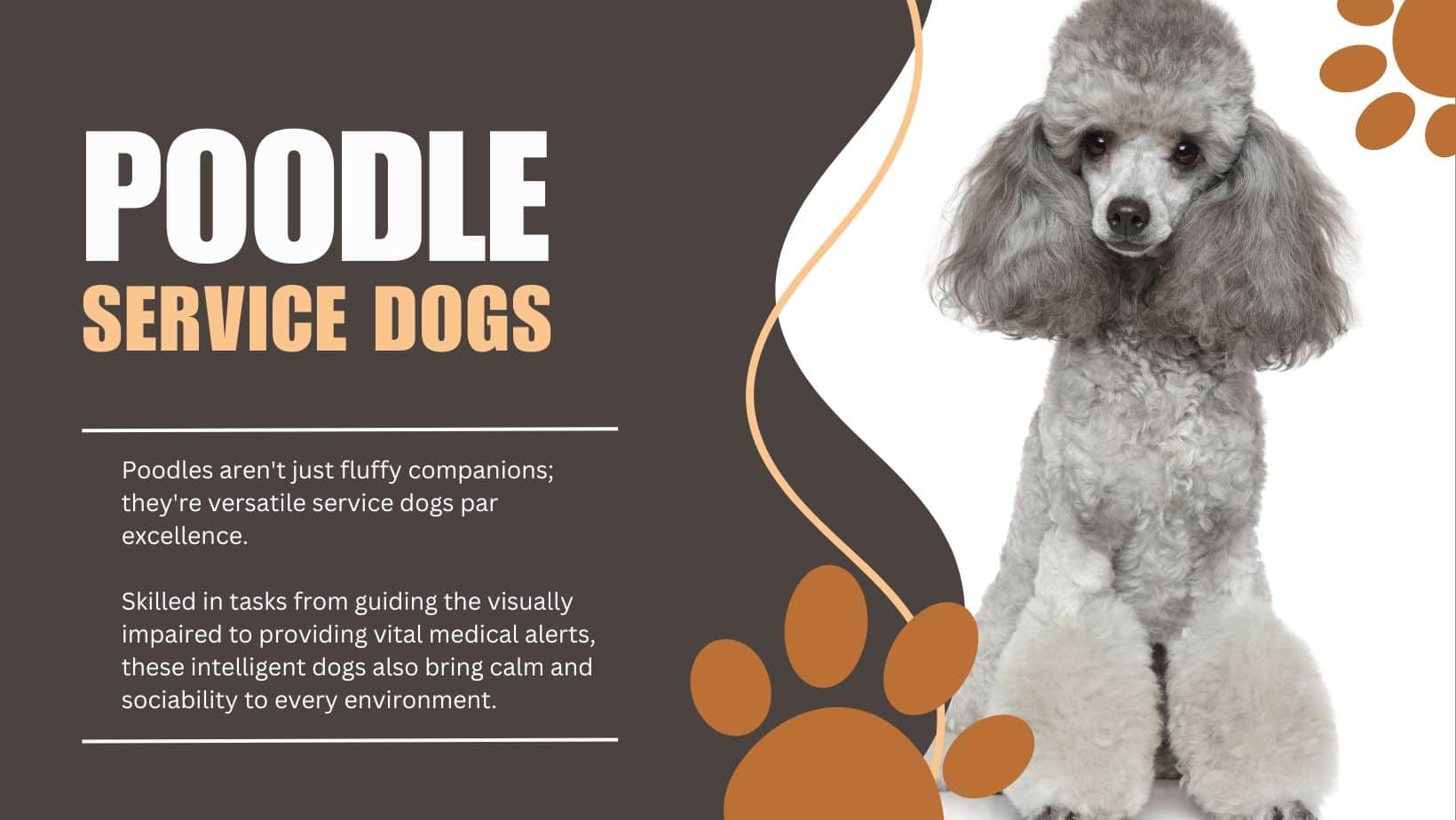
Training a poodle as a service dog requires specialized, consistent practice. This training harnesses their natural abilities and hones them into professional skills.
Transitioning to life with a poodle service dog is more than just owning a pet; it’s about forming a partnership that brings independence, security, and companionship.
Moreover, the benefits of having a poodle service dog extend to an improved quality of life and a deep bond based on mutual trust and respect. It’s crucial to navigate the legal and societal responsibilities of service dog ownership, as well as understand the financial implications.
The key to success with a poodle service dog lies in selecting the right dog that meets your specific needs, ensuring a perfect partnership.
Key Takeaways of a Poodle Service Dog
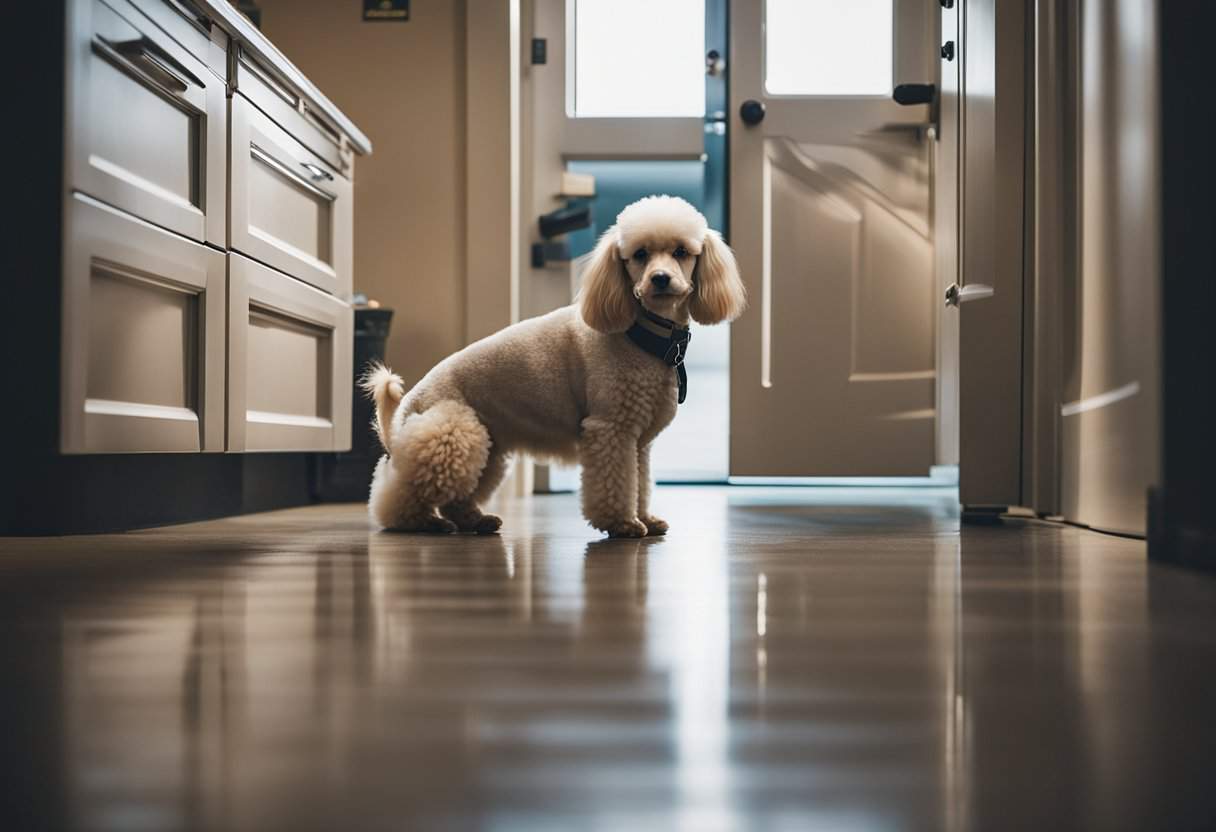
- Poodles are becoming a prominent choice for service dogs due to their intelligence and hypoallergenic coats.
- They are adept at learning a variety of tasks to assist individuals with different needs and are ideal for public interaction.
- Potential owners should understand the commitment and responsibilities involved, including training, legal considerations, and financial aspects.
Poodle Service Dog Characteristics
Poodles are highly regarded as service dogs due to their distinct physical and behavioral qualities. They offer an ideal blend of intelligence, trainability, and a hypoallergenic coat which make them suitable companions for individuals with disabilities.
Physical Traits
Poodles come in three sizes: standard, miniature, and toy. Standard Poodles are the largest, standing over 15 inches at the shoulder. Their coat is curly, dense, and can be styled in various cuts. Notably, poodles have a hypoallergenic coat, which reduces allergic reactions, making them a popular choice for those with allergies.
- Coat Texture: Curly and dense
- Size Range:
- Standard: Over 15 inches
- Miniature: 10-15 inches
- Toy: Under 10 inches
Temperament
Your Poodle service dog will exhibit a friendly and obedient temperament. They are known for being attentive and bond closely with their handlers.
Poodles are also generally calm and adaptable, providing comfort and support in different settings without getting overly distressed by changes in routine or environment.
10 Key Temperamental Traits of a Poodle Service Dog:
- Intelligence: Poodles are renowned for their sharp minds, making them quick learners and adept problem-solvers, essential for various service tasks.
- Alertness: They are naturally vigilant, always aware of their surroundings, which is crucial for anticipating and responding to their handler’s needs.
- Calm Demeanor: Despite their alertness, poodles typically exhibit a calm and composed nature, especially important in public or stressful situations.
- Empathy: Poodles have a keen sense of empathy, allowing them to be in tune with their handler’s emotions and needs, providing comfort and support.
- Sociability: They generally interact well with people and other animals, making them suitable for work in diverse environments.
- Trainability: Poodles are highly trainable, responding well to positive reinforcement and consistent training methods, vital for service dog work.
- Adaptability: They are adaptable to different environments and situations, whether it’s navigating crowded spaces or adapting to a handler’s changing health conditions.
- Loyalty: Poodles are known for their strong loyalty to their handlers, creating a dependable and trusting bond essential for effective service work.
- Gentleness: They typically exhibit a gentle approach, which is comforting for handlers who require a soft, careful presence.
- Patience: Patience is a key trait in poodles, enabling them to handle repetitive tasks and training with ease, an important aspect of service dog duties.
Each of these traits contributes to the poodle’s effectiveness as a service dog, making them not just skilled companions, but also indispensable aids to their handlers.
Intelligence and Trainability of a Poodle Service Dog
Poodles rank among the smartest dog breeds; this intelligence makes them exceptionally trainable. You’ll find them to be quick learners, eager to please, and capable of performing a variety of tasks as service dogs.
Their smartness is instrumental in complex training that service dogs undergo to support their handlers.
10 Learning Capabilities of a Poodle Service Dog
- Fast Learning: Poodles can quickly grasp new commands and skills, demonstrating an ability to learn complex tasks efficiently.
- Memory Retention: They have an excellent memory, allowing them to remember a wide range of commands and routines over long periods.
- Problem-Solving Skills: Poodles are capable of independent problem-solving, making them adept at navigating unexpected situations during service work.
- Adaptability in Training: They can adapt to different training styles and environments, making them versatile learners.
- Understanding of Nuanced Commands: Poodles are able to understand and respond to subtle cues and nuanced commands, essential in service work.
- Sensory Learning: They are highly attuned to sensory cues, allowing them to respond effectively to sounds, sights, and smells relevant to their service tasks.
- Emotional Intelligence: Poodles possess a high level of emotional intelligence, enabling them to learn and respond to the emotional states of their handlers.
- Consistency in Performance: Once trained, poodles can consistently perform tasks and routines, demonstrating a reliable work ethic.
- Social Learning: They are good at learning from social interactions with humans and other animals, enhancing their ability to function in social settings.
- Conditioned Response Learning: Poodles excel at learning through conditioning, allowing them to make associations between specific signals and their required responses.
These learning capabilities make poodles highly effective as service dogs, capable of undertaking a range of tasks to assist their handlers in daily life. Their intelligence and adaptability are key to their success in various service roles.
Benefits of Poodles as Service Dogs
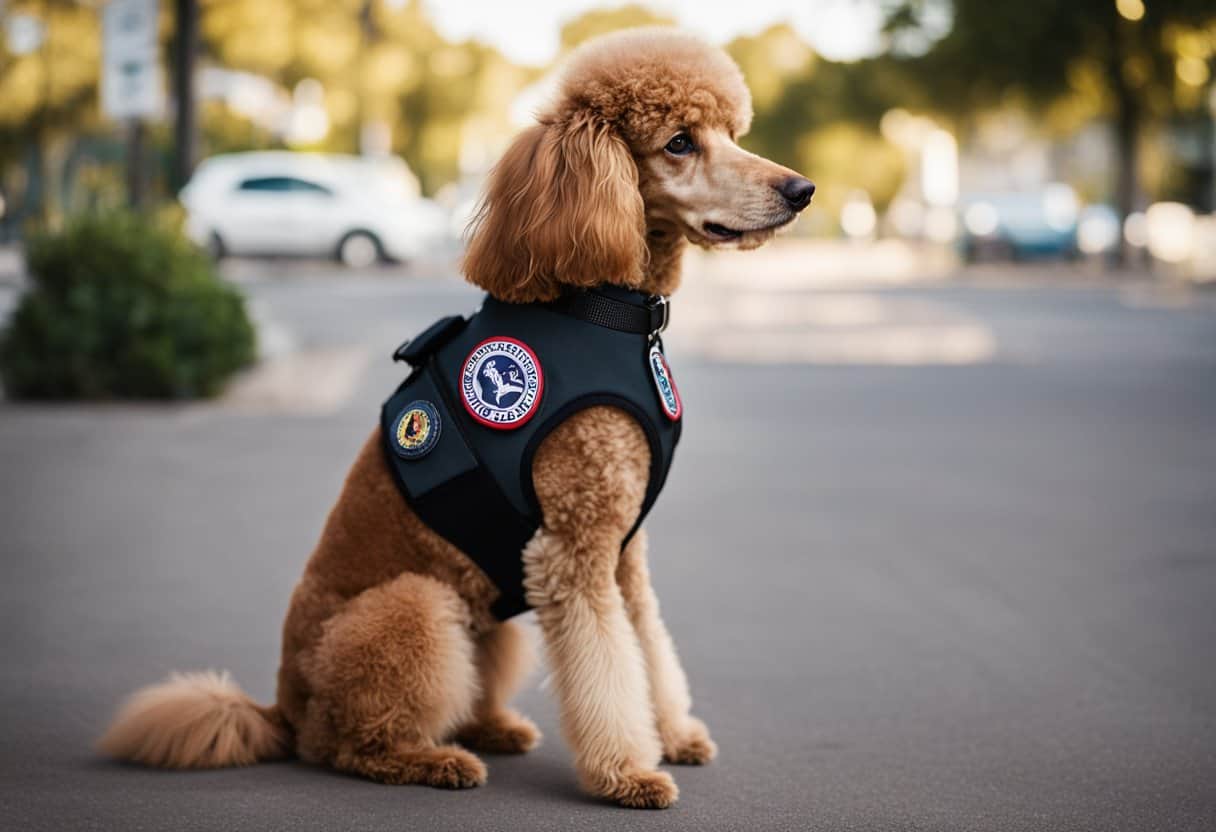
Poodles excel as service dogs, offering unique advantages due to their hypoallergenic coats and high intelligence. Their adaptability in performing various tasks makes them invaluable partners for individuals with disabilities.
Hypoallergenic Qualities
Poodles possess a hypoallergenic coat which is an essential trait for service dogs. This minimizes the risk of allergic reactions, making them a suitable option for you if you have allergies.
The distinct hair-like fur of poodles traps dander, which is what typically triggers allergic symptoms.
Mobility Assistance
Poodles are known for their intelligent and trainable attributes, enabling them to adeptly perform a range of mobility tasks.
For those with disabilities, such as difficulties in movement or balance, poodles can be taught to retrieve items, open doors, or even help with transferring you from one place to another.
Emotional Support and Therapy
Poodles possess a gentle and attentive demeanor, which makes them excellent for providing emotional support and serving as therapy dogs. They can sense and respond to emotional cues, helping to alleviate feelings of anxiety or symptoms of PTSD.
Their capacity to engage in specialized training allows them to assist individuals with autism, offering both comfort and consistency.
Training a Poodle for Service Work
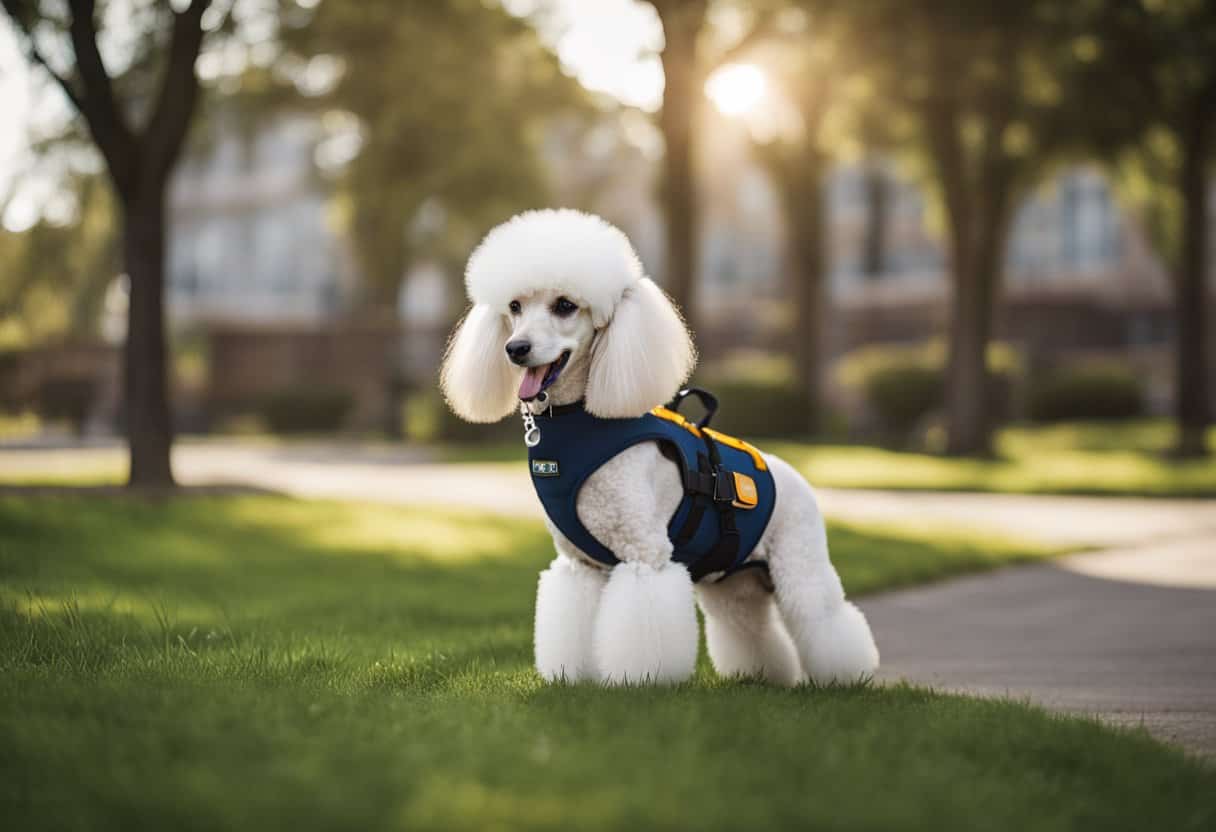
Training a poodle for service work involves a systematic approach to develop specific skills that cater to the needs of individuals with disabilities.
This includes tailored training for different disabilities, mastering obedience and public access skills, and fulfilling service tasks to meet certification requirements.
Training for Specific Disabilities
When training your poodle for service work, it is important to identify the specific disability needs it will cater to. For autism, the focus is on social interaction and creating a calming presence.
In contrast, a poodle being trained for hearing impairments must learn to respond to auditory cues and alert their partner. Poodles assisting with mental disabilities need to develop an understanding of emotional support, while medical alert dogs should be able to detect and warn about medical episodes.
- Autism: Social behavior, interruptive actions
- Hearing Impairments: Alert to sounds, alarm response
- Mental Disability: Emotional support, stability
- Medical Alert Dogs: Episode detection, alerting behaviors
Obedience and Public Access Skills for Poodle Service Dogs
Obedience Training
Firstly, your poodle must master essential obedience skills to qualify as a service dog. This requires intensive training focusing on commands like sit, stay, come, and heel.
Use positive reinforcement consistently to cultivate and reinforce good behavior. Active engagement in these training exercises ensures that your poodle remains focused and responsive.
Key Obedience Commands:
- Sit: Quickly responding to the sit command in various environments.
- Stay: Maintaining position until given a release command, even with distractions.
- Come: Immediately coming to the handler when called, regardless of distractions.
- Heel: Walking closely beside the handler, maintaining pace and position.
Public Access Skills
Additionally, public access skills are crucial. Your poodle should exhibit impeccable behavior in public settings, staying calm amidst various distractions. Training should emphasize control and politeness in different public scenarios.
Essential Public Access Skills:
- Quiet Behavior: Remaining silent unless commanded to speak, avoiding unnecessary barking.
- No Jumping: Resisting the urge to jump on people or objects.
- Ignoring Food: Not reacting to food on the ground or offered by strangers.
- Navigating Crowds: Moving through crowds calmly without showing anxiety or aggression.
- Ignoring Other Animals: Staying focused on the handler, not getting distracted by other animals.
- Adapting to Different Environments: Comfortably functioning in various settings like stores, restaurants, and public transport.
- Reacting Appropriately to Distractions: Maintaining composure when faced with loud noises, sudden movements, or other potential distractions.
By mastering these obedience and public access skills, your poodle will be well-prepared for the responsibilities of being a service dog, ensuring safety and effectiveness in their role.
Service Tasks and Certification for Poodle Service Dogs
Service Task Training
The training journey begins with your poodle learning specialized service tasks, each closely aligned with the specific type of service work they will undertake. For example, poodles trained as psychiatric service dogs master tasks aimed at mitigating mental disability symptoms.
This targeted training emphasizes the active and precise execution of tasks, underscoring the poodle’s intelligence and adaptability in service roles.
Key Service Tasks of a Poodle Service Dog:
- Item Retrieval: Fetching specific items on command to assist with daily tasks.
- Activating Push Plates: Operating buttons and push plates to open doors or access elevators.
- Providing Balance: Offering physical support for mobility and balance.
- Alerting to Sounds: Notifying the handler of important sounds like alarms or doorbells.
- Interrupting Harmful Behaviors: Disturbing repetitive or harmful behaviors in handlers with psychiatric conditions.
- Guiding in Public Spaces: Navigating the handler safely through crowded or complex environments.
- Medical Alert: Recognizing and alerting to medical emergencies such as seizures.
- Calming Pressure Therapy: Applying gentle pressure to provide comfort during anxiety or panic attacks.
Certification Process
After mastering these service tasks, the next essential phase is certification. This involves an extensive assessment by a professional trainer, ensuring the poodle’s skillful completion of service tasks.
The certification process, conducted through recognized service dog programs, is crucial for validating your poodle’s role as a capable assistant. It also guarantees the preservation of public access rights, recognizing your poodle as a legitimate service dog.
Certification Steps:
- Professional Trainer Assessment: A comprehensive review by an experienced trainer to validate the poodle’s ability to perform service tasks effectively.
- Service Dog Certification Programs: Participation in accredited certification programs, securing official acknowledgment of the poodle’s status as a service dog.
With this thorough training and proper certification, your poodle will be fully equipped and acknowledged as a proficient service dog, ready to provide invaluable assistance in your daily life.
Living With a Poodle Service Dog
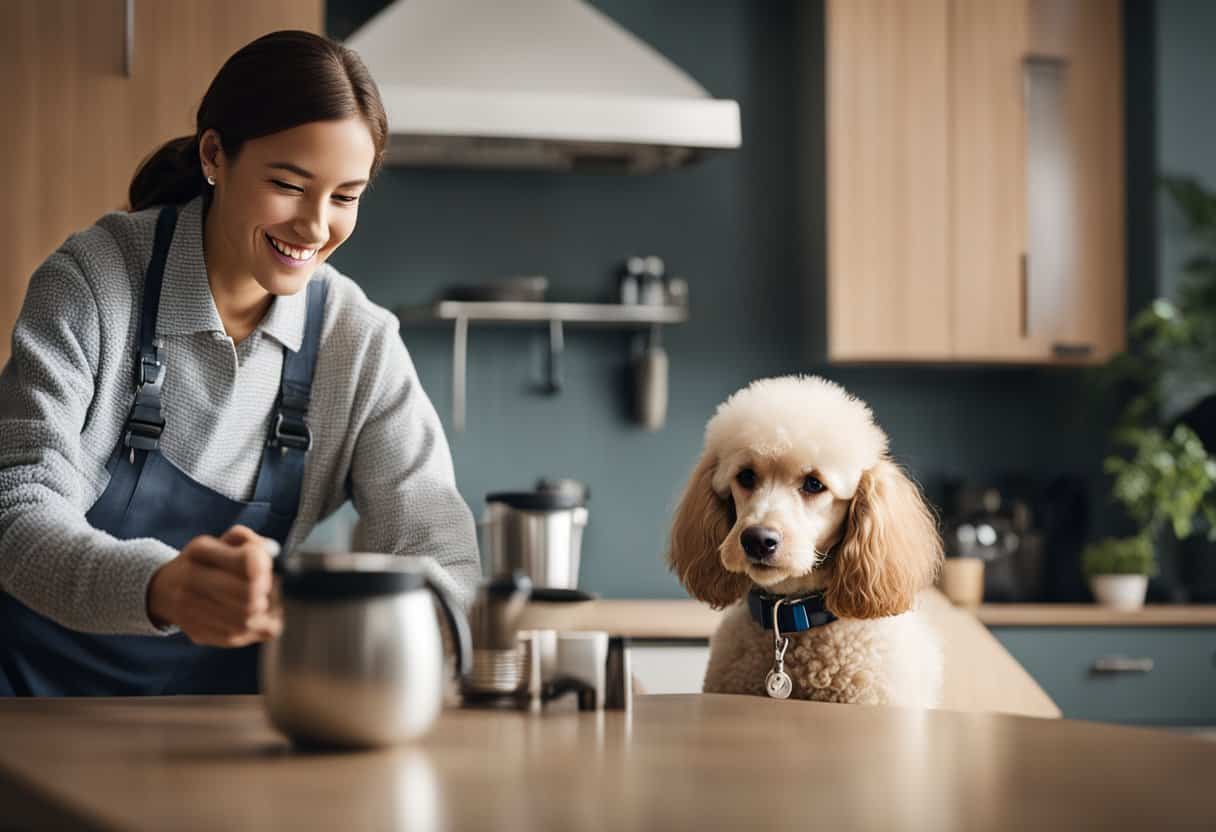
Incorporating a poodle service dog into your life requires understanding their unique needs in terms of exercise, grooming, and adaptability to various settings.
Here’s what you should know to foster a supportive partnership.
Exercise and Activity Needs
Your poodle service dog’s energy level necessitates regular exercise to maintain optimal physical and mental health. Engaging in at least:
- 30 minutes of brisk walking
- 15 minutes of fetch or play
is crucial daily. Service tasks themselves can also provide forms of activity, but additional structured exercise is vital to keep your poodle active and content.
Grooming and Maintenance
Grooming is paramount for standard poodles due to their curly coats. You’ll need to schedule:
- Weekly brushing sessions to prevent mats
- Regular professional grooming every 3-6 weeks
This attention to grooming helps prevent health problems that can arise from neglected coats, such as skin infections or discomfort.
Adapting to Family and Public Life
Poodles are known for their adaptability and affection, making them great at integrating into family life. In public settings, your poodle service dog should wear a vest to signify their role, helping with mobility work or other service tasks.
Familiarize them early on with different environments to ensure comfort in a variety of public facilities.
Poodle Service Dog: Legal and Societal Considerations
When you consider a poodle as your service dog, it’s essential to be aware of the legal frameworks that protect your rights and the societal norms that may affect your experience.
Americans with Disabilities Act Compliance
The Americans with Disabilities Act (ADA) is pivotal in securing your rights as an individual with disabilities. Certification isn’t mandated by the ADA for your poodle to be recognized as a service dog.
Instead, the law requires that your service dog is trained to perform specific tasks directly related to your disability. This ensures your independence without sifting through red tape.
- Key Aspects of ADA Compliance for Your Service Dog:
- No certification requirement: The ADA does not require service dogs to be certified.
- Task-specific training: Your poodle must be trained to perform tasks that mitigate aspects of your disability.
Public Access and Accommodations
Under the ADA, you’re entitled to bring your poodle service dog into public places. From restaurants to hospitals, public facilities must accommodate your service dog.
The effort made by facilities to provide access often leads to significant health benefits by reducing isolation and increasing community involvement.
- Public Access Rights:
- Access to public facilities
- Right to be accompanied by your service dog
Note: Private entities that serve the public are also covered by the ADA.
Qualifications and Rights
Qualification as a service dog hinges on whether your poodle has been trained for task-specific roles. Your dog’s presence must be a direct effort to mitigate the impact of your disability.
It’s important to understand that entities may ask you two questions:
- Is the dog a service animal required because of a disability?
- What work or task has the dog been trained to perform?
These questions underscore your right to privacy and ensure your poodle’s service status is respected without disclosing the nature of your disability.
- Your Rights as a Service Dog Handler:
- Privacy: Limited inquiries as to the nature of your service dog’s work or tasks.
- Public Accommodation: Assurance that your service dog is legally recognized in public settings.
Selecting a Poodle Service Dog
When you’re considering a poodle as your service dog, focusing on temperament, health, and the breeder’s reputation ensures a good match for your needs.
Choosing the Right Temperament
Selecting a poodle with the appropriate temperament is pivotal for service dog tasks. Poodles are known for their intelligence and trainability, making them excellent service dogs. Look for a calm and attentive poodle that shows a keen interest in learning and responding to commands. Consistency in behavior is also crucial, as service dogs should not be easily distracted and must perform tasks reliably.
- Key Temperament Traits for Service Poodles:
- Intelligence
- Trainability
- Calm demeanor
- Attention to detail
Health and Vaccinations
Your poodle’s health significantly impacts its ability to serve effectively. Ensure the poodle is free from health problems and has a record of all necessary vaccinations. A physically fit dog is less prone to developing conditions that could impair its role as a service dog. To confirm health status, request documentation that the dog has been screened for common poodle health issues such as hip dysplasia.
- Health Checklist:
- Up-to-date vaccinations
- Hip dysplasia screening
- Regular check-ups
- Preventative treatments for common ailments
Finding a Reputable Breeder
A reputable breeder is essential for acquiring a service-quality poodle. They should provide verifiable information about the poodle’s lineage, health, and previous training. Breeders with a specialization in service dogs often produce poodles that are not only hypoallergenic breeds but also accustomed to the rigors of service work. Ask for references and proof of the breeder’s experience with service dog training, and be cautious of those unable to provide a transparent history of the poodle’s upbringing.
- Breeder Checklist:
- Specialization in service dog training
- Transparency in health and lineage of the poodle
- Clear communication and availability for follow-up
- Positive references from previous clients
Cost Considerations of Owning a Poodle Service Dog
When considering the acquisition of a poodle as a service dog, you must prepare for several financial commitments. Service dogs, including poodles, are often more expensive due to their extensive training.
Initial Costs
- Purchase Price: Varies depending on the agency; poodles, labrador retrievers, and golden retrievers are popular breeds for service work.
- Training Expense: Training can be substantial as it needs to be specialized.
Maintenance Costs
- Food: Quality nutrition tailored to your poodle’s energetic needs.
- Vet Visits: Regular check-ups and emergency health care.
- Grooming: Poodles require regular grooming to maintain their coat and overall health.
Insurance
- Health Insurance: Can mitigate unexpected veterinary costs.
- Liability Insurance: Recommended for any potential damages.
Miscellaneous Expenses
- Accessories: Leashes, harnesses, and service dog vests.
- Travel: Additional costs if alternative transportation or accommodation is required.
While the costs may seem daunting, finance options may be available through service dog agencies. Additionally, the affection and assistance of a poodle service dog can be invaluable. Always ensure you choose a reputable agency to guarantee the quality of your service dog’s training and health.
Frequently Asked Questions about Poodle Service Dogs
In this section, you will find detailed answers to some of the most common inquiries regarding Poodle service dogs. Discover the unique benefits they offer, the training process, and how to select the right Poodle for service.
What are the advantages of Poodles as service dogs?
Poodles are highly intelligent and trainable, making them excellent service dogs. Their hypoallergenic coats reduce the chances of allergic reactions for individuals they assist. Additionally, their attentive and social nature ensures that they form strong bonds with their handlers, providing reliable assistance and companionship.
How do you train a Poodle to be a service dog?
Training a Poodle to be a service dog involves socialization, obedience training, and specific task training that’s directly related to the handler’s needs. You typically start with basic commands and gradually introduce more complex tasks tailored to your requirements.
Which Poodle size is most suitable for service dog work?
The Standard Poodle is most commonly used in service work due to its size, strength, and stamina. However, Miniature and Toy Poodles may be preferred for certain types of service work where a smaller dog is beneficial, like medical alert service or when travel with the dog is frequent.
What are the best Poodle mixes for service dog tasks?
Labradoodles (Labrador Retriever and Poodle mix) and Goldendoodles (Golden Retriever and Poodle mix) are popular Poodle mixes for service dog tasks. They inherit the Poodle’s intelligence and hypoallergenic coat along with the Labrador’s and Golden Retriever’s temperament, making them well-suited for various service roles.
Where can one find reputable breeders specializing in Poodles for service work?
To find a reputable breeder specializing in Poodles for service work, seek out breeders who perform genetic testing, offer health clearances, and raise puppies in a home environment. Associations like the Poodle Club of America can provide referrals to breeders who follow ethical breeding practices for service dogs.
Can Poodles with a history of anxiety be trained effectively as service dogs?
While Poodles with a history of anxiety may face challenges in service work, proper training and conditioning can help mitigate these issues. The key is to work with a qualified trainer who has experience in helping dogs overcome anxiety and to ensure the dog is mentally fit for service tasks.
Wrapping Up our Poodle Service Dog Journey
In conclusion, the poodle service dog stands out as a remarkable and intelligent choice for those in need of assistance. With their versatile skills, empathetic nature, and ease of training, poodles not only offer practical support but also become devoted companions.
Whether it’s navigating daily challenges or providing emotional support, a poodle service dog enriches lives, fostering a bond of mutual trust and respect.
Embracing a poodle as your service dog means embarking on a fulfilling journey with a furry partner uniquely attuned to your needs.
-

Coffee Mug – In Dog Coffees I’ve Only Had One
$11.95 – $14.95 Select options This product has multiple variants. The options may be chosen on the product page
